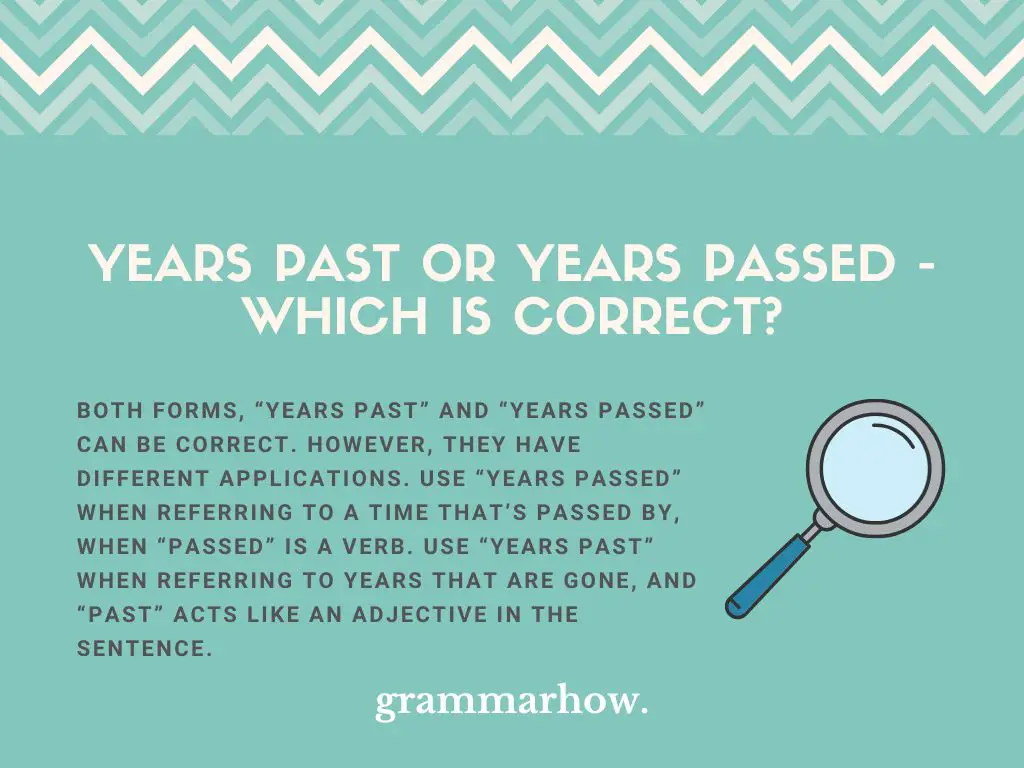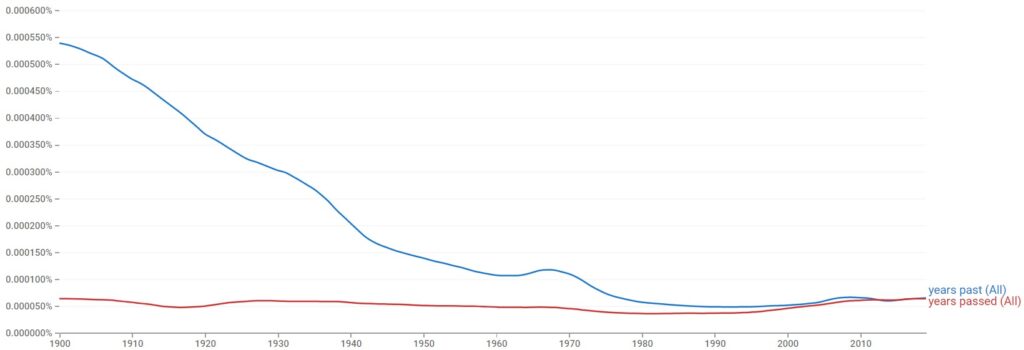Sometimes, it can be tricky to use the correct word when two similar options sound the same. For example, when talking about a time that’s gone, should we say “Years Past” or “Years Passed”?
Let’s find you the correct one to use, and which to avoid.
Years Past or Years Passed – Which Is Correct?
Both forms, “Years Past” and “Years Passed” can be correct. However, they have different applications. Use “Years Passed” when referring to a time that’s passed by, when “Passed” is a verb. Use “Years Past” when referring to years that are gone, and “Past” acts like an adjective in the sentence.

It sounds more difficult than it is. So let’s start by going over some examples.
- In years past, Greg’d always put his job first.
- In years passed, Greg’d always put his job first. (incorrect)
- As the years passed after his wife left, Robert focused more on his career.
- As the years past, after his wife left, Robert focused more on his career. (incorrect)
Each set of sentences is correct for one of the phrases. Take a look at the first set. “Years Past” in the first sentence is a way to describe a set of years in which the main characteristic is that they are in the past, long gone.
“Years Past” is the correct form in this instance, because we’re not discussing a time passing by. We don’t need a verb to indicate an action, but we need an adjective to describe that timeframe when Greg put his job first.
The second set of sentences, on the other hand, indicates time passing by. There’s an action involved in the sentence, which is why “Years Passed” is the correct form in this situation. Every time your sentence needs to indicate an action involving time, use “Years Passed”.
Years Past
“Past” means a time before the present. It can work as many different things in a sentence, but never as a verb. “Years Past” is a set phrase that describes several years in the past or, in other words, a timeframe that’s long gone.
Let’s take a look at some very helpful examples:
- The company’s policies have changed, it’s not like years past anymore.
- She’s faced a lot of loss in years past.
- In years past, Tonya skipped between jobs often.
- Clark spent most of his time traveling, in years past.
- In years past, I have focused on my studies.
Years Passed
“Passed” is the past tense of the verb “Pass”, and “Years Passed” should be used when an individual needs to describe a timeframe that has passed by. It provides context, clarifying that whatever is being described took a long time, or continued to happen over a long time.
Take a look at the examples below:
- Hank’s been lonely in the years passed since Anna left.
- Years passed since Rosa acquired the business, but she’s still incredibly busy.
- Many years passed, But Bel and Marina remain the best of friends.
- In the years passed since I moved, I’ve struggled to meet new people.
- Years may have passed, but Haroldo will never be replaced.
Which Is Used the Most?
Which one of those forms is used more often, “Years Past” or “Years Passed”? We know that those phrases have different applications, but we remain curious.
Take a look at the graph from Google Ngram Viewer below.

Currently, both phrases seem to have similar usage. “Years Passed” has maintained its position over the years, and seen a small increase in the last couple of decades.
“Years Past”, on the other hand, has seen a considerable drop in usage until the 1980s and seems to have stabilized after that. We think this happened because “Years Past” is an obsolete way to express a time in the past.
Still, keep in mind that both “Years Past” and “Years Passed” are correct and can be used.
Final Thoughts
“Years Past” and “Years Passed” have different applications. Both are grammatically correct and acceptable. “Years Past” should be used to describe a timeframe that’s long gone. “Years Passed” should be used to indicate the action of time passing by, going by while something happens.

Martin holds a Master’s degree in Finance and International Business. He has six years of experience in professional communication with clients, executives, and colleagues. Furthermore, he has teaching experience from Aarhus University. Martin has been featured as an expert in communication and teaching on Forbes and Shopify. Read more about Martin here.
